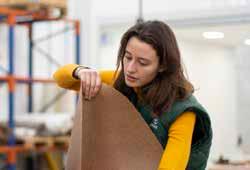
4 minute read
“Without industry there can be no forestry production and without forestry production there can be no industry”
Owned by the Pais de Azevedo family for more than four generations, the Herdade da Sanguinheira de Codes, in the municipality of Abrantes, is an example of good forest management practices, with a major focus on sustainability. In an interview with Amorim News, Joaquim Pais de Azevedo defends a balanced agroforestry management system, which makes it possible to preserve and continue this legacy, with an eye on the future.
The estate has 620 hectares, including two forest areas, crossed by a long irrigated valley, with moorland. In the Herdade da Sanguinheira de Codes, that has been owned by the Pais de Azevedo family for more than four generations, nature, time and human intervention have created an agro-pastoral system where plants, animals and people co-exist in harmony. The estate’s manager, the engineer Joaquim Pais de Azevedo, explains that the system’s “backbone” is the cork oak forest, which occupies 70% of the estate. Other forestry species - such as eucalyptus and stone pine trees - coexist with the cork oak tree, and occupy respectively, 15% and 4% of the land. The rest is occupied by agricultural zones (8%) and social areas (3%, including paths and buildings and a small dam, in the extreme north of the estate). The history of the Herdade da Sanguinheira de Codes, which Joaquim Pais de Azevedo and his sister inherited from their father, is present in every piece of land, in every tree planted, in every sheep that grazes, in an extensive and rotational regime, applied in each of the estate’s seven fenced plots, promoting regeneration of the cork oak forest. Joaquim Pais de Azevedo has his eyes set on the future, aware that it is up to him, like previous generations, to preserve what they have inherited, and if possible improve it. He counts on help from his 26-year-old son Joaquim Maria, who has been working in Sanguinheira for the past four years. The family’s relationship to the cork oak tree and cork, dates back many decades and is expected to continue: “My son already works here, and my grandson is already inspired by the cork oak tree and cork. He has already accompanied us during cork harvesting campaigns on several occasions”, he says.
Award for Good Forestry Practices As a result of this work, the Herdade da Sanguinheira de Codes was distinguished with the Best Forestry Practices Award in 2017, awarded by the Prémio Floresta e Sustentabilidade (Forest and Sustainability Award). The forest producer emphasises the importance of good forest management practices, in particular those with a greater focus on sustainability, and says that what is being done in the Herdade da Sanguinheira is not unique: “We are no exception”, says Joaquim Pais de Azevedo. “We manage the cork oak forest just as other forest producers manage it. Managing the cork oak forest in a professional, efficient manner, that promotes sustainability, involves high costs. But if we don’t manage cork oak forests this also incurs high costs: it may be easier in the short term, but in the medium and long term the forest producer will have less and lower quality cork”, he summarises. Rome was not built in a day, and neither was a healthy, efficient and sustainable cork oak forest. “It’s a long process, that doesn’t happen overnight”, underlines Joaquim Pais de Azevedo. “It’s a question of maintaining the balance – between soil, pasture, brushland, cork oak trees and animals. And all this in symbiosis. Without each production undermining the others.” In Joaquim Pais de Azevedo’s opinion, one of the ways to increase the profitability of the cork oak forest is linked to ecosystem services. “Cork oak forests are carbon sinks, they help regulate the water cycle, prevent erosion, and are the basis of unique biodiversity. These are services that we all benefit from”, he says. “These services are a cork oak product that we do not sell and that we should sell”. The key issue, in the forest producer’s opinion, is communication, but there are other important issues. “As producers, we can’t get this message across properly to public opinion in general. It’s the forest producer who defends the forest, who defends the environment, who defends these agro-silvo-pastoral systems. And the forest producer has to generate profits. It’s a common good. But there has to be political will”.
The evolution of the cork harvesting system To preserve the future of the cork oak forest, this issue will have to be considered, as well as the evolution of the cork harvesting system, in the sense of the introduction or dissemination of technologies that improve the cork stripping process. “Such machines have been developed for years, but now Corticeira Amorim, which has the necessary drive and financial muscle has invested heavily in R&D for these technologies. I think this is very good, because it is perhaps one of the few companies that can bring this system to fruition”, concludes Joaquim Pais de Azevedo. In terms of R&D, particularly in terms of increasing our knowledge of the cork oak tree and cork, Corticeira Amorim’s Forestry Intervention Project assumes a strategic role: “As a world leader, I believe that Corticeira Amorim also has an obligation to promote scientific studies of this tree, the cork oak tree. There is a great deal of technology related to cork production and processing. As a forestry producer, Amorim is now also committed to promoting research in this sector. This is undoubtedly to be welcomed, as long as such knowledge is shared with all forestry producers. Without industry there can be no forestry production, and without forestry production there can be no industry. This is not a question of poetry: we have to advance arm in arm and walk in the same direction, with the same objective”.










